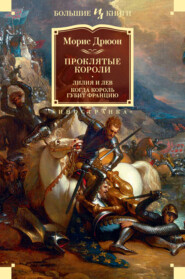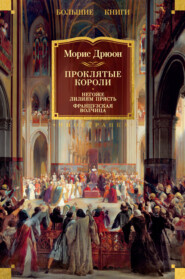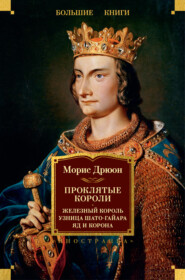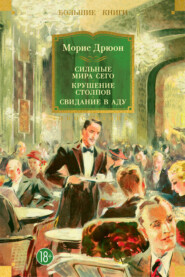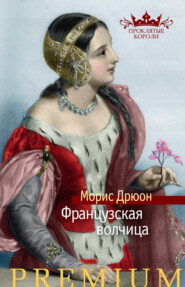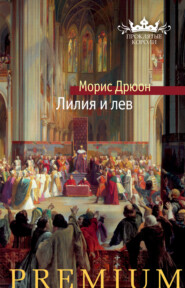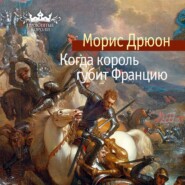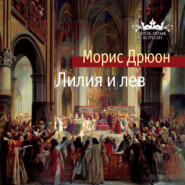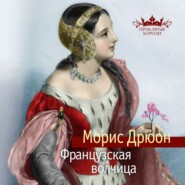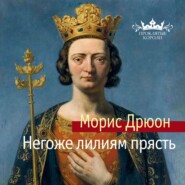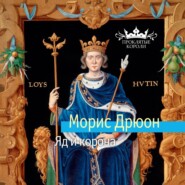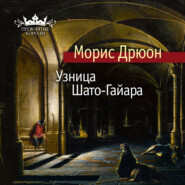По всем вопросам обращайтесь на: info@litportal.ru
(©) 2003-2025.
✖
The She-Wolf
Автор
Год написания книги
2019
Настройки чтения
Размер шрифта
Высота строк
Поля
BOCCACCIO, a traveller for the Bardi Company, father of the poet.
THE CRESSAY FAMILY:
PIERRE AND JEAN DE CRESSAY, sons of the late Lord of Cressay, aged about 31 and 29.
MARIE, their sister, secret wife to Guccio Baglioni, aged 25.
JEAN, called Jeannot or Giannino, supposed son of Guccio Baglioni and of Marie de Cressay, in fact JEAN THE POSTHUMOUS, son of Louis X Hutin and of Clémence of Hungary, aged 7.
All the above names have their place in history; their ages are given as in the year 1323.
The She-Wolf of France (#ulink_f6ab6bde-76b1-5550-8857-9821ab9c3bea)
‘I SEE,’ SAID ISABELLA, ‘that you wish me to be left utterly alone.’
‘What do you mean by alone, Madame?’ cried Hugh the Younger in his fine, well-modulated voice. ‘Are we not all your loyal friends, being the King’s? And is not Madame Alienor, my devoted wife, a faithful companion to you? ‘That’s a pretty book you have there,’ he added, pointing to the volume, ‘and beautifully illuminated; would you be kind enough to lend it to me?’
‘Of course, of course the Queen will lend it to you,’ the King said. ‘I am sure, Madame, that you will do us the pleasure of lending the book to our friend Gloucester?’
‘Most willingly, Sire my husband, most willingly. And I know what lending means when it’s to your friend, Lord Despenser. I lent him my pearls ten years ago and, as you can see, he’s still wearing them about his neck.’
She would not surrender, but her heart was beating wildly in her breast. From now on she would have to bear the daily insults all alone. If, one day, she found means of revenging herself, nothing would be forgotten.
Prologue (#ulink_3738a1c6-c38d-5b31-b103-b8b9e595594f)
THE CHASTISEMENTS PROPHESIED by the Grand Master of the Templars and the curses he had hurled from amid the faggots of his pyre continued to fall on France. Fate had destroyed her kings like pieces on a chess-board.
Philip the Fair having died as if struck down by lightning, and his eldest son, Louis X, having been murdered after eighteen months on the throne, Philippe V, his second son, seemed destined for a long reign. But now six years had gone by, and Philippe V had died in his turn before attaining the age of thirty.
Let us look for a moment at his reign which, compared with the tragedies and disasters that were to follow, seems something of a respite from calamity. If you glance casually through a history of the period, it may seem a colourless reign, possibly because your hand comes away from the page unstained with blood. And yet, if we look deeper, we shall see of what a great king’s days consist if Fate is against him.
For Philippe V, the Long, had been a great king. By a mixture of force and cunning, of legality and crime, he had seized the crown, when it was at auction to the ambitious, while still a young man. An imprisoned conclave, a royal palace taken by assault, an invented law of succession, a provincial revolt put down in a ten days’ campaign, a great lord cast into prison and a royal child murdered in its cradle – or so at least it was supposed – had all been stages on his rapid path to the throne.
On that January morning in 1317, when, as the bells rang out in the heavens, the second son of the Iron King had come out of Rheims Cathedral, he had reason to believe that he had triumphed, and was now free to pursue his father’s grand policies, which he had so much admired. His family had all had to bow to his will. The barons were checkmated; Parliament had submitted to his ascendancy, and the middle classes had acclaimed him, delighted to have a strong Prince again; his wife had been washed clean of the stain of the Tour de Nesle; his succession seemed assured by the son who had recently been born to him; and, finally, coronation had endued him with intangible majesty. There seemed to be nothing lacking to Philippe V’s enjoyment of the relative happiness of kings, not least the wisdom to desire peace and recognize its worth.
Three weeks later his son died. It was his only male child, and Queen Jeanne, barren from henceforth, would give him no more.
At the beginning of summer the country was ravaged by famine and the towns were strewn with corpses.
And then, soon afterwards, a wave of madness broke over the whole of France.
Driven by blind and vaguely mystical impulses, primitive dreams of sanctity and adventure, by their condition of poverty and by a sudden frenzy for destruction, country boys and girls, sheep-, cow- and swineherds, young artisans, young spinners and weavers, nearly all of them between fifteen and twenty, abruptly left their families and villages, and formed barefoot, errant bands, provided with neither food nor money. Some wild idea of a crusade was the pretext for the exodus.
Indeed, madness had been born amid the wreckage of the Temple. Many of the ex-Templars had gone half-crazy through imprisonment, persecution, torture, disavowals torn from them by hot irons, and by the spectacle of their brothers delivered to the flames. A longing for vengeance, nostalgia for lost power, and the possession and knowledge of certain magic practices learnt in the East had turned them into fanatics, who were all the more dangerous because they disguised themselves in a cleric’s humble robe or in a workman’s smock. They had re-formed themselves into a secret society; and they obeyed the mysteriously transmitted orders of a clandestine Grand Master, who had replaced the Grand Master burnt at the stake.
It was these men who had suddenly transformed themselves one winter into village preachers and, like the Pied Piper of the Rhine legends, had led away the youth of France: to the Holy Land, they said. But their real goal was to wreck the kingdom and ruin the papacy.
And Pope and King were equally powerless in the face of these visionary hordes travelling the roads, these human rivers swelling at every cross-roads as if the lands of Flanders, Normandy, Brittany and Poitou were bewitched.
In their thousands, their twenty thousands, their hundred thousands, the pastoureaux were marching towards mysterious goals. Unfrocked priests, apostate monks, brigands, thieves, beggars and whores, all joined their bands. At the head of these columns a cross was carried, while the girls and boys indulged in the utmost licence, committed the worst excesses. A hundred thousand ragged marchers, entering a town to beg, soon pillaged it. And felony, which was at first merely an accessory to theft, soon became the satisfaction of a vice.
The pastoureaux ravaged France for a whole year and, indeed, with a certain method in their madness. They spared neither churches nor monasteries. Paris, aghast, saw an army of plunderers invade its streets, and King Philippe V spoke pacifically to them from a window of his palace. They urged the King to place himself at their head. They took the Châtelet by assault, attacked the Provost, and pillaged the Abbey of Saint-Germain-des-Prés. Then new orders, mysterious as those assembling them, directed them on to the roads to the south. The people of Paris were still trembling with fear when the pastoureaux were already flooding into Orléans. The Holy Land was far away; Bourges, Limoges, Saintes, the Périgord and the Bordelais, Gascony and Agenais had to suffer their fury.
Pope John XXII grew alarmed as the flood approached Avignon and he threatened these false crusaders with excommunication. But they had need of victims, and they found the Jews. From then on, the urban populations applauded the massacres and fraternized with the pastoureaux. Amid the ghettoes of Lectoure, Auvillar, Castelsarrasin, Albi, Auch and Toulouse were to be seen here a hundred and fifteen corpses, and there a hundred and fifty-two. There was not a city in Languedoc that did not suffer this expiatory butchery. The Jews of Verdun-sur-Garonne used their children as missiles, and then cut each others’ throats so as not to fall into the hands of the lunatics.
Then the Pope ordered his bishops and the King his seneschals to protect the Jews, whose commerce was important to them. The Count of Foix, going to the help of the Seneschal of Carcassonne, had to fight a pitched battle with the pastoureaux and drove them back into the marches of Aigues-Mortes, where they died in their thousands, stabbed, bludgeoned, engulfed or drowned. The land of France was quaffing its own blood, devouring its own youth. In the end, the clergy and the officers of the crown joined in hunting down the survivors. The gates of the towns were closed to them; they were denied food and lodging; they were pursued into the passes of the Cévennes. Those captured were hanged in groups of twenty or thirty to the branches of trees. For most of the next two years there were still some bands wandering about; and they ranged as far as Italy before they finally disappeared.
France, the body corporate of France, was sick. Hardly had the pastoureaux fever abated, than lepers appeared.
Who could tell whether these tragic people, their flesh corroded, their faces death-masks, their hands stumps, who could tell whether these pariahs, restricted to lazar-houses or infected, pestilential villages, where they procreated among themselves, and whence they were forbidden to emerge without a clapper in their hands, were in truth responsible for polluting the waters of France? For in the summer of 1321 the springs, brooks, wells and fountains were in many places poisoned. And during that year the people of France panted thirstily beside their generous rivers, or drank only with fear in their hearts, expecting death at every sip. And had the Temple anything to do with that strange poison – compounded of human blood, urine, magic herbs, adders’ heads, powdered toads’ legs, desecrated hosts and the pubic hair of whores – which it was asserted had been introduced into the water supply? Had the Temple incited this accursed race to rebellion, inspiring it, as some lepers admitted under torture, to will the death of all Christians or infect them with leprosy?
It began in Poitou, where King Philippe V was staying; and soon spread over the whole kingdom. The inhabitants of town and countryside attacked the leper colonies and exterminated the members of the diseased race who had suddenly become public enemies. Pregnant women were alone spared, but only till their child was born. Then they were burnt. The royal judges endued these hecatombs with legality, and the nobility supplied men-at-arms. Then the public turned against the Jews once again, accusing them of being involved in a huge, if vague, conspiracy, inspired, so it was said, by the Moorish Kings of Granada and Tunis. It seemed as if France were trying to allay her agony and fear with gigantic human sacrifices.
The wind of Aquitaine was impregnated with the appalling stench of the pyres. At Chinon all the Jews in the bailiwick were thrown into one huge fiery pit; in Paris they were burnt on that island opposite the Château Royal, which so tragically bore their name, and where Jacques de Molay had uttered his fatal prophecy.
Then the King died of the fever and the appalling stomach pains he had contracted in his appanage of Poitou; he died of having drunk the water of his kingdom, poisoned by some of his subjects.
He wasted away till he became a skeleton; and it took him five months to die, suffering the most appalling agonies.
Every morning, in the Abbey of Longchamp, to which he had been carried, he had the doors of his room thrown wide, allowing the passers-by to approach his bed, so that he might say to them: ‘Look on the King of France, your Sovereign Lord, the most miserable man in all his kingdom, for there is not one among you with whom I would not change my lot. My children, look on your temporal Prince, and give your hearts to God at the sight of how it pleases Him to sport with His creatures of this world.’
He went to join the bones of his ancestors, at Saint-Denis, the day after Epiphany 1322; and no one, save his wife, wept for him.
And yet he had been a wise King, careful of the public good. He had declared every part of the royal domains, that is to say, France proper, inalienable; he had unified the currency and weights and measures, reorganized the law so that it might be applied with greater equity, forbidden pluralism in public offices, refused to allow prelates to sit in parliament, and systematized the administration of the country’s finances. It was due to him also that the emancipation of the serfs was developed. He desired that serfdom should disappear altogether from his realms; he wanted to reign over a people who enjoyed the ‘true liberty’ with which nature had endowed them.
He had avoided the temptations of war, had suppressed many of the garrisons in the interior of the country to reinforce those on the frontiers, and had invariably preferred negotiation to foolish military escapades. It was no doubt too soon as yet for the people to grasp the fact that justice and peace were necessarily expensive or, indeed, to understand why the King so ardently required their co-operation. ‘What has happened,’ they asked, ‘to the revenues, to the tithes and annates, to the subventions of the Lombards and the Jews, since less charity has been distributed, no wars have been made, and no buildings constructed? Where has all the money gone?’
The great barons, who were only temporarily submissive, and who had only on occasion, and when faced with the threat of war, rallied round the King from fear, had been patiently awaiting the hour of revenge, and now contemplated the death agonies of the young King they had never loved with a certain satisfaction.
Philippe V, the Long, a lonely man who was too much in advance of his time, died misunderstood by his subjects.
He left only daughters; the law of succession he had promulgated for his own advantage now excluded them from the throne. The crown went to his younger brother, Charles de la Marche, who was as dull of mind as he was handsome of face. The powerful Count of Valois, Count Robert of Artois and all the Capet cousins and the reactionary barons were once again triumphant. At last you could talk of a crusade again, become involved in the intrigues of the Empire, traffic in the price of gold, and watch, not without mockery, the difficulties of the kingdom of England.
For in England an unstable, dishonest and incompetent king, a prey to an amorous passion for his favourite, was fighting his barons and bishops. He, too, was soaking the soil of his kingdom with his subjects’ blood.
And there a Princess of France was living a life of humiliation and ignominy both as wife and queen. She was afraid for her life, was conspiring for her own safety, and dreaming of vengeance.
It was as if Isabella, the daughter of the Iron King and the sister of Charles IV of France, had carried the curse of the Templars across the Channel.
PART ONE (#ulink_b55a4925-13ca-566a-a541-1353087c1f68)
1 (#ulink_ad5839e0-a5db-536d-ae6b-4e7cd396c00e)
‘No One ever Escapes from the Tower of London’ (#ulink_ad5839e0-a5db-536d-ae6b-4e7cd396c00e)
A MONSTROUS RAVEN, HUGE, gleaming and black, nearly as big as a goose, was hopping about in front of the dungeon window. Sometimes it halted, lowered a wing and hypocritically closed its little round eye as if in sleep. Then, suddenly darting out its beak, it pecked at the man’s eye shining behind the bars. His grey, flint-coloured eyes seemed to have a special attraction for the bird. But the prisoner was too quick for it and had already drawn his face back out of danger. The raven continued its constitutional, taking short, heavy hops.
Then the man reached his hand out of the window. It was a long, shapely, sinewy hand. He moved it forward slowly, then let it lie still, like a twig on the dusty ground, hoping to seize the raven by the neck.






